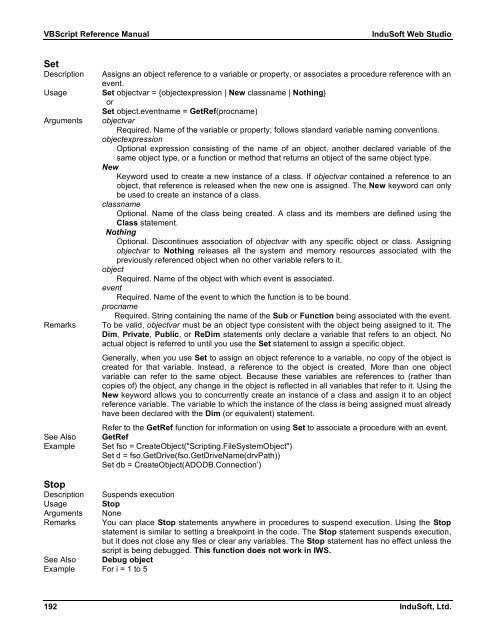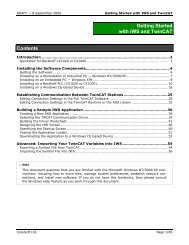VBScript Reference Manual for InduSoft Web Studio
VBScript Reference Manual for InduSoft Web Studio
VBScript Reference Manual for InduSoft Web Studio
Create successful ePaper yourself
Turn your PDF publications into a flip-book with our unique Google optimized e-Paper software.
<strong>VBScript</strong> <strong>Reference</strong> <strong>Manual</strong> <strong>InduSoft</strong> <strong>Web</strong> <strong>Studio</strong><br />
Set<br />
Description Assigns an object reference to a variable or property, or associates a procedure reference with an<br />
event.<br />
Usage Set objectvar = {objectexpression | New classname | Nothing}<br />
or<br />
Set object.eventname = GetRef(procname)<br />
Arguments objectvar<br />
Required. Name of the variable or property; follows standard variable naming conventions.<br />
objectexpression<br />
Optional expression consisting of the name of an object, another declared variable of the<br />
same object type, or a function or method that returns an object of the same object type.<br />
New<br />
Keyword used to create a new instance of a class. If objectvar contained a reference to an<br />
object, that reference is released when the new one is assigned. The New keyword can only<br />
be used to create an instance of a class.<br />
classname<br />
Optional. Name of the class being created. A class and its members are defined using the<br />
Class statement.<br />
Nothing<br />
Optional. Discontinues association of objectvar with any specific object or class. Assigning<br />
objectvar to Nothing releases all the system and memory resources associated with the<br />
previously referenced object when no other variable refers to it.<br />
object<br />
Required. Name of the object with which event is associated.<br />
event<br />
Required. Name of the event to which the function is to be bound.<br />
procname<br />
Required. String containing the name of the Sub or Function being associated with the event.<br />
Remarks To be valid, objectvar must be an object type consistent with the object being assigned to it. The<br />
Dim, Private, Public, or ReDim statements only declare a variable that refers to an object. No<br />
actual object is referred to until you use the Set statement to assign a specific object.<br />
Generally, when you use Set to assign an object reference to a variable, no copy of the object is<br />
created <strong>for</strong> that variable. Instead, a reference to the object is created. More than one object<br />
variable can refer to the same object. Because these variables are references to (rather than<br />
copies of) the object, any change in the object is reflected in all variables that refer to it. Using the<br />
New keyword allows you to concurrently create an instance of a class and assign it to an object<br />
reference variable. The variable to which the instance of the class is being assigned must already<br />
have been declared with the Dim (or equivalent) statement.<br />
Refer to the GetRef function <strong>for</strong> in<strong>for</strong>mation on using Set to associate a procedure with an event.<br />
See Also GetRef<br />
Example Set fso = CreateObject("Scripting.FileSystemObject")<br />
Set d = fso.GetDrive(fso.GetDriveName(drvPath))<br />
Set db = CreateObject(ADODB.Connection’)<br />
Stop<br />
Description Suspends execution<br />
Usage Stop<br />
Arguments None<br />
Remarks You can place Stop statements anywhere in procedures to suspend execution. Using the Stop<br />
statement is similar to setting a breakpoint in the code. The Stop statement suspends execution,<br />
but it does not close any files or clear any variables. The Stop statement has no effect unless the<br />
script is being debugged. This function does not work in IWS.<br />
See Also Debug object<br />
Example For i = 1 to 5<br />
192 <strong>InduSoft</strong>, Ltd.



